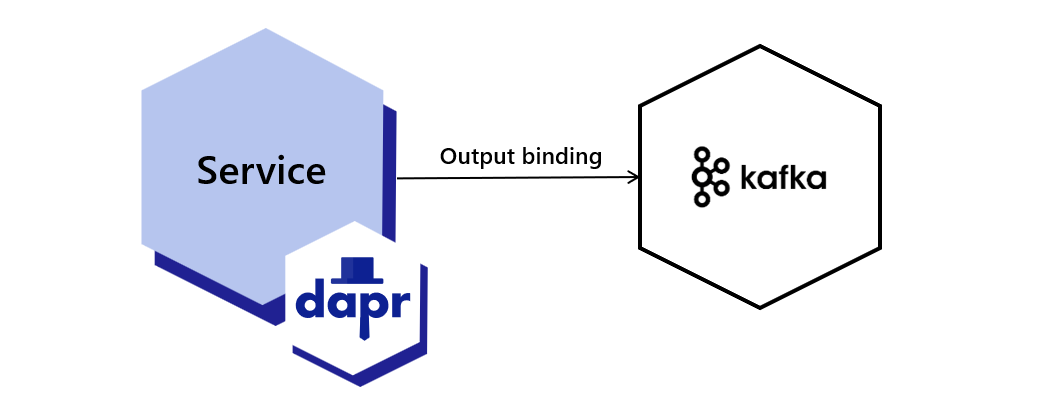How-To: Use output bindings to interface with external resources
With output bindings, you can invoke external resources. An optional payload and metadata can be sent with the invocation request.

This guide uses a Kafka binding as an example. You can find your preferred binding spec from the list of bindings components. In this guide:
- The example invokes the
/bindingendpoint withcheckout, the name of the binding to invoke. - The payload goes inside the mandatory
datafield, and can be any JSON serializable value. - The
operationfield tells the binding what action it needs to take. For example, the Kafka binding supports thecreateoperation.
Note
If you haven’t already, try out the bindings quickstart for a quick walk-through on how to use the bindings API.Create a binding
Create a binding.yaml file and save to a components sub-folder in your application directory.
Create a new binding component named checkout. Within the metadata section, configure the following Kafka-related properties:
- The topic to which you’ll publish the message
- The broker
When creating the binding component, specify the supported direction of the binding.
Use the --resources-path flag with dapr run to point to your custom resources directory.
apiVersion: dapr.io/v1alpha1
kind: Component
metadata:
name: checkout
spec:
type: bindings.kafka
version: v1
metadata:
# Kafka broker connection setting
- name: brokers
value: localhost:9092
# consumer configuration: topic and consumer group
- name: topics
value: sample
- name: consumerGroup
value: group1
# publisher configuration: topic
- name: publishTopic
value: sample
- name: authRequired
value: false
- name: direction
value: output
To deploy the following binding.yaml file into a Kubernetes cluster, run kubectl apply -f binding.yaml.
apiVersion: dapr.io/v1alpha1
kind: Component
metadata:
name: checkout
spec:
type: bindings.kafka
version: v1
metadata:
# Kafka broker connection setting
- name: brokers
value: localhost:9092
# consumer configuration: topic and consumer group
- name: topics
value: sample
- name: consumerGroup
value: group1
# publisher configuration: topic
- name: publishTopic
value: sample
- name: authRequired
value: false
- name: direction
value: output
Send an event (output binding)
The code examples below leverage Dapr SDKs to invoke the output bindings endpoint on a running Dapr instance.
Here’s an example of using a console app with top-level statements in .NET 6+:
using System.Text;
using System.Threading.Tasks;
using Dapr.Client;
var builder = WebApplication.CreateBuilder(args);
builder.Services.AddDaprClient();
var app = builder.Build();
const string BINDING_NAME = "checkout";
const string BINDING_OPERATION = "create";
var random = new Random();
using var daprClient = app.Services.GetRequiredService<DaprClient>();
while (true)
{
await Task.Delay(TimeSpan.FromSeconds(5));
var orderId = random.Next(1, 1000);
await client.InvokeBindingAsync(BINDING_NAME, BINDING_OPERATION, orderId);
Console.WriteLine($"Sending message: {orderId}");
}
//dependencies
import io.dapr.client.DaprClient;
import io.dapr.client.DaprClientBuilder;
import io.dapr.client.domain.HttpExtension;
import org.springframework.boot.autoconfigure.SpringBootApplication;
import org.slf4j.Logger;
import org.slf4j.LoggerFactory;
import java.util.Random;
import java.util.concurrent.TimeUnit;
//code
@SpringBootApplication
public class OrderProcessingServiceApplication {
private static final Logger log = LoggerFactory.getLogger(OrderProcessingServiceApplication.class);
public static void main(String[] args) throws InterruptedException{
String BINDING_NAME = "checkout";
String BINDING_OPERATION = "create";
while(true) {
TimeUnit.MILLISECONDS.sleep(5000);
Random random = new Random();
int orderId = random.nextInt(1000-1) + 1;
DaprClient client = new DaprClientBuilder().build();
//Using Dapr SDK to invoke output binding
client.invokeBinding(BINDING_NAME, BINDING_OPERATION, orderId).block();
log.info("Sending message: " + orderId);
}
}
}
#dependencies
import random
from time import sleep
import requests
import logging
import json
from dapr.clients import DaprClient
#code
logging.basicConfig(level = logging.INFO)
BINDING_NAME = 'checkout'
BINDING_OPERATION = 'create'
while True:
sleep(random.randrange(50, 5000) / 1000)
orderId = random.randint(1, 1000)
with DaprClient() as client:
#Using Dapr SDK to invoke output binding
resp = client.invoke_binding(BINDING_NAME, BINDING_OPERATION, json.dumps(orderId))
logging.basicConfig(level = logging.INFO)
logging.info('Sending message: ' + str(orderId))
//dependencies
import (
"context"
"log"
"math/rand"
"time"
"strconv"
dapr "github.com/dapr/go-sdk/client"
)
//code
func main() {
BINDING_NAME := "checkout";
BINDING_OPERATION := "create";
for i := 0; i < 10; i++ {
time.Sleep(5000)
orderId := rand.Intn(1000-1) + 1
client, err := dapr.NewClient()
if err != nil {
panic(err)
}
defer client.Close()
ctx := context.Background()
//Using Dapr SDK to invoke output binding
in := &dapr.InvokeBindingRequest{ Name: BINDING_NAME, Operation: BINDING_OPERATION , Data: []byte(strconv.Itoa(orderId))}
err = client.InvokeOutputBinding(ctx, in)
log.Println("Sending message: " + strconv.Itoa(orderId))
}
}
//dependencies
import { DaprClient, CommunicationProtocolEnum } from "@dapr/dapr";
//code
const daprHost = "127.0.0.1";
(async function () {
for (var i = 0; i < 10; i++) {
await sleep(2000);
const orderId = Math.floor(Math.random() * (1000 - 1) + 1);
try {
await sendOrder(orderId)
} catch (err) {
console.error(e);
process.exit(1);
}
}
})();
async function sendOrder(orderId) {
const BINDING_NAME = "checkout";
const BINDING_OPERATION = "create";
const client = new DaprClient({
daprHost,
daprPort: process.env.DAPR_HTTP_PORT,
communicationProtocol: CommunicationProtocolEnum.HTTP,
});
//Using Dapr SDK to invoke output binding
const result = await client.binding.send(BINDING_NAME, BINDING_OPERATION, orderId);
console.log("Sending message: " + orderId);
}
function sleep(ms) {
return new Promise(resolve => setTimeout(resolve, ms));
}
You can also invoke the output bindings endpoint using HTTP:
curl -X POST -H 'Content-Type: application/json' http://localhost:3601/v1.0/bindings/checkout -d '{ "data": 100, "operation": "create" }'
Watch this video on how to use bi-directional output bindings.
References
Feedback
Was this page helpful?
Glad to hear it! Please tell us how we can improve.
Sorry to hear that. Please tell us how we can improve.